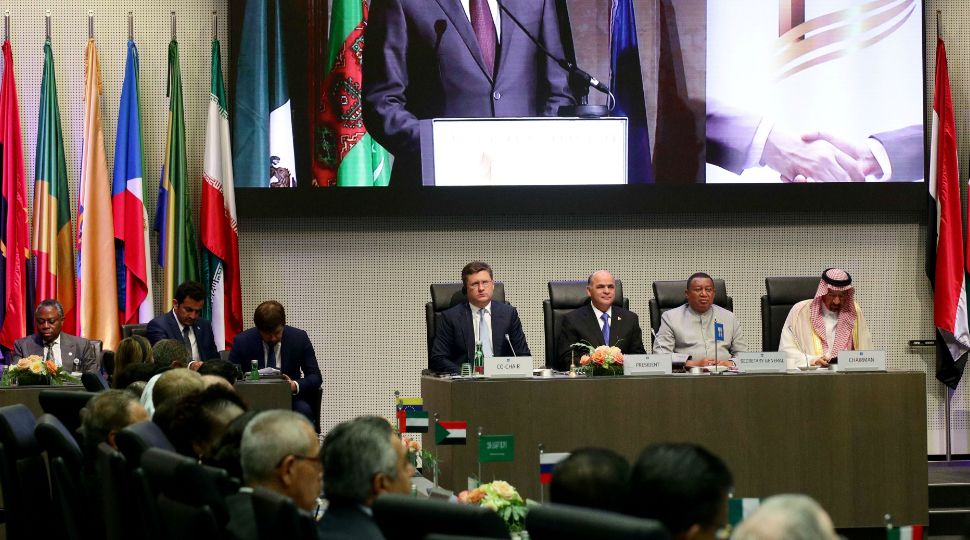The Collapse of Oil Prices: Economic and Political Implications

Why the Prices Dropped
Oil prices were first impacted by the economic slowdown caused by the spread of the coronavirus (SARS-CoV-2, COVID-19). Demand fell in part because of lower demand for transport fuel. As a result, the average price for Brent Crude fell from $64 per barrel at the beginning of the year to $55.70 in February. According to initial forecasts after the outbreak, the price in the first half of 2020 was to be $57–58.
The fall in oil prices was exacerbated by the start of a price war between Russia and Saudi Arabia. This marked the end to the policy of production cuts by OPEC+ members (OPEC countries with producers outside the organisation) which had been possible thanks to Saudi-Russian cooperation as the two countries account for more than 25% of global production, making them de facto the force in OPEC+. Last year, OPEC+ countries agreed to decrease oil output by 1.7 million barrels per day (mbpd). Saudi Arabia and a few other countries voluntary cut production by an addition 0.4 mbpd. However, during the OPEC summit on 5 March (the day before the OPEC+ talks), OPEC recommended to extend the 1.7 mbpd cuts until the end of 2020 plus cut an additional 1.5 mbpd through the end of June. Russia was ready at best to extend the cuts that were agreed in 2019 to the end of June, so it took the new pressure as blackmail and quit the negotiations. As a result, Saudi Arabia and Russia increased their rivalry over oil market share and started a price war. The Saudis announced discounts for oil buyers in the U.S., Europe, and Asia and other oil exporters followed. As a result, oil prices fell below $20 per barrel.
The Rivalry for the Oil Market
The reasons for the failure of the talks are more complex than just the cuts. Russian oil companies, which planned to increase output, opposed cooperation with OPEC from the beginning. One of the most vocal opponents was Igor Sechin, the powerful CEO of Rosneft, who argued that the production cuts benefited U.S. oil producers/exporters. Both the Saudis and the Russians want to weaken U.S. shale-oil producers; however, Russia probably also wanted to retaliate for sanctions imposed by the U.S. on Rosneft subsidiaries that had enabled Venezuela to export oil, sidestepping American sanctions on the South American country. As a result, a Chinese buyer excluded Rosneft from a tender.
The low prices and shrinking market, though, present a new, serious challenge to both Russia and Saudi Arabia. Russia had just rebuilt its financial reserves from $368 billion in 2015 to $570 billion and reduced its foreign debt, and its budget was based on the price of Urals oil of around $40 per barrel (Urals is a Russian oil type that is usually a bit cheaper than Brent). The Russian finance minister claimed that Russia is prepared for $25-30 oil prices for 6-10 years, but analyses by his ministry as well as the Russian central bank show that such prices would cause serious damage to the Russian economy. The issue is the budget’s resilience in case of a broader crisis resulting in lower revenue from other areas besides oil exports and the need to use funds to stimulate the economy. The low prices also will hit expensive Russian Arctic oil and gas projects.
The Saudi economy also is not that well-diversified and its financial reserves have dropped by about a third in the last five years to around $500 billion. Saudi Arabia’s budget for this year is also based on an oil price of more than $60. National oil champion Saudi Aramco claimed that $30 is acceptable, but the low prices are forcing it to cut investments by 15-29% while also boosting production capacities. After the price collapse, the Saudis cut their national budget, which could undermine plans to transform its oil-dependent economy through the “Vision 2030” plan, which includes the development of green technologies.
As a result of the rivalry between Russia and Saudi Arabia, a worsening of relations between the countries is possible. They blame each other for the March OPEC+ summit failure and relations could be impacted, among others, by information about Saudi-Belarusian negotiations on oil supplies. The economic crisis could also undermine the position of Saudi Prince Mohammed Bin Salman and the popularity of Russian President Vladimir Putin.
International Implications
The collapse of oil prices will be a challenge for the U.S., the world’s biggest oil consumer and producer. It endangers thousands of jobs in the oil sector, including the shale industry (more than 60% of U.S. oil is produced from unconventional reserves). Despite the increase in production for around 10 years, the sector is in a difficult position because investors are less keen on this industry and companies have already cut spending. All of this is especially difficult because this is a presidential election year. The Trump administration initiated some support for domestic producers (e.g., oil purchases for the strategic petroleum reserve) but policymakers have limited options to directly influence the global market. The key for the U.S. is to persuade Saudi Arabia and Russia to resume the negotiations in OPEC+ and then the other oil producers might join the talks (e.g., U.S., Canada, Brazil).
The drop in oil prices, falling demand, and the fight for market share raise serious challenges to other producers, especially countries dependent on oil revenues that struggle with internal stability. Venezuela, where Nicolas Maduro is fighting to remain in power, is one example and another is Libya, torn by civil war. The situation also will affect Iraq, which recently faced mass protests, and its economy, dependent on oil exports. Lower budget revenues mean a serious economic blow for these countries and in some cases might lead to destabilisation and/or humanitarian crises, with a response made more difficult by the pandemic.
The oil-related challenges could have serious implications for Iran, which planned its budget at prices of around $50 and exports of 1 mbpd. These plans are undermined by U.S. sanctions, low demand, and drop in oil prices, as well as the Saudi competition. Furthermore, Iran has been severely impacted by the pandemic and before that, the authorities suppressed mass protests. These factors could be a challenge to the regime’s stability, which in turn could lead to it being more oppressive.
Prospects
The drop in oil prices will not lead to higher demand because the fall-off in consumption is caused by the economic slowdown resulting from the pandemic. Also, the market oversupply and need to store the excess oil might be a significant challenge in the coming months. Companies will cut investments and exporters will compete for a market that could shrink by even 20% this year compared to 2019. The lower prices are beneficial for importers, including Poland, whose share of oil from Saudi Arabia to total imports increased from 8% in the first six months of 2018 to 15% in the second half of 2019. This will not balance out the economic impact of the pandemic but can make further diversification easier.
Despite the competition for market share, increasing the prices of oil is high on the agenda of Russia, Saudi Arabia, the U.S., and other exporters. Some oil-producing countries are discussing production cuts of around 10 mbpd (around 10% of global demand before the crisis); Russia wants the U.S. to join these cuts, which might be problematic since its companies are private entities and some do not support reductions. Besides, the U.S. is considering tariffs on Saudi and Russian oil if both countries can’t reach an agreement. The talks are also complicated by other issues, such as the methodology of calculating the cuts.
Regardless of the results of the talks—which (if successful) will to some extent influence oil prices—the adverse oversupply in the market will remain. In case the negotiations progress, Saudi Arabia and Russia will try to gain politically from them. Russian diplomacy will probably promote the image of Russia as a constructive stakeholder to help in its push to at least partially lift the U.S. and EU sanctions. Saudi Arabia, thanks to its rapid additional supplies of cheap oil, weakened its competitors before the negotiations. In case the talks are successful, the Saudis will try to portray Saudi Arabia as responsible for the wide adoption of the policy the Saudis pushed forward within OPEC+. This will also help strengthen Saudi Arabia’s role in international affairs, which is important because of the G20 summit scheduled for Riyadh in the fall.




